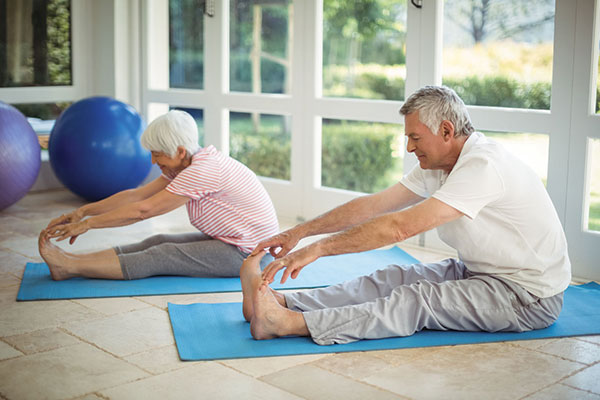Yoga May Boost Physical and Mental Health of People with Advanced Lung Cancer, and Their Caregivers
New research, presented at the 2017 Palliative and Supportive Care in Oncology Symposium in San Diego, CA, shows that yoga offered both physical and mental benefits to people with advanced lung cancer receiving radiation therapy, and to their caregivers.
“It is never too late to engage in exercise, and we know from earlier studies that people can exercise while being treated with chemotherapy or radiation,” says lead study author Kathrin Milbury, PhD, an assistant professor of cancer medicine in the Department of Palliative Care and Rehabilitation Medicine at the University of Texas MD Anderson Cancer Center in Houston, TX. “Caregivers sometimes have more anxiety and sleeping problems than patients. Therefore, we thought that having the patient and caregiver go through yoga instruction together would be beneficial for both partners.”
Prior research has shown that women with breast cancer benefit from an exercise regimen. Because people with lung cancer usually have more symptoms, are older, and are in worse physical shape than women with breast cancer, researchers believed yoga was a low-impact exercise they could perform easily. Additionally, yoga has a strong emphasis on breathing, a principal issue for people with lung cancer who often have shortness of breath.
Yoga has a strong emphasis on breathing, a principal issue for people with lung cancer who often have shortness of breath.
“Choosing yoga as the form of exercise to use in this study was important because it is a gentle form of exercise readily modifiable for patients’ needs, and it easily allowed for partners to participate in the yoga practices,” says Dr. Milbury. “Among the yoga poses we chose to include in this study are what are known as chest openers – exercises that emphasize stretching the chest area along with deep breathing.”
About Yoga and the Study
All the cancer survivors in this feasibility trial had advanced lung cancers that could not be removed surgically, were receiving radiation therapy to their chest, and most also received chemotherapy. Each one participated with a family caregiver. The pairs were then randomly assigned to either yoga classes or a waitlist for future yoga instruction (with those on the waitlist forming the control group).
The yoga program emphasized three key areas: physical postures, breathing exercises, and meditation. The program consisted of 15 sessions of yoga lasting 60 minutes each, a protocol based on outcomes from earlier research on yoga in people with breast cancer.
Key Findings
When comparing the yoga pairs with the control waitlist pairs, the researchers found that the lung cancer survivors who practiced yoga had significantly better physical function as assessed by a six-minute walking test, better stamina to perform work or daily activities, and improved mental health, while the caregivers who received yoga instruction had improvements in fatigue and stamina while working.
“This was a feasibility study, so it is very hard to tease out the specific effects of our intervention, but that will be a next step in our research,” says Dr. Milbury.
Future Research
The researchers caution that they have not shown that yoga is superior to other forms of exercise, such as swimming or hiking, but they do believe that they have demonstrated that it is a holistic experience. Enrollees included only people at MD Anderson and did not make up a racially diverse population. Greater inclusiveness will be a goal of future research efforts.
“There is currently very little research on behavioral supportive care for people with lung cancer,” says Dr. Milbury. “We tried to look at one way to boost patient and caregiver well-being, both physically and mentally, as a means to enhance supportive care.”
Lung cancer survivors in the study reported that it was good to be away from their cancer experience during the yoga sessions, and the survivors and caregivers both noted that they enjoyed learning something new together. “We were thrilled to hear that many of our pairs said they would continue to do yoga on their own,” says Dr. Milbury.
For more detailed information on this and other studies presented at the 2017 Palliative and Supportive Care in Oncology Symposium, visit pallonc.org. For patient-friendly news highlights, visit Cancer.Net.
This article was published in Coping® with Cancer magazine, November/December 2017.


